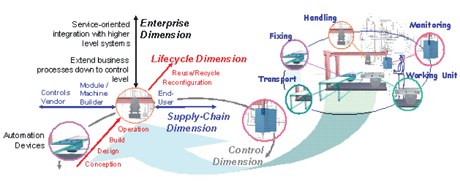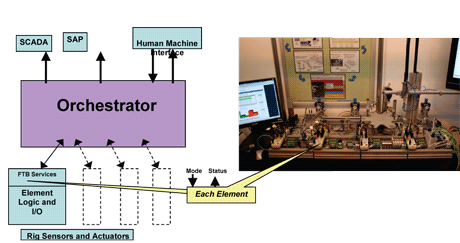by R Harrison, F Jammes, H Smit and T Kirkham
Increased access to device-level automation components is closing the final gap in the enterprise computing model.
The implementation of Web service-enabled sensors and actuators on production lines will permanently change the way in which future automation systems are designed and implemented. Current interfaces to automation components are largely vendor-specific, restricting the reconfiguration of lines and the management of line data across enterprises. Outside the automation domain, enterprise system development has seen real-time data linkage take great steps in the office, warehouse and supply chain. Research into the use of Web-service-enabled sensors and actuators has the potential to present an open standards-based method to integrate production lines into this enterprise computing model, an innovation that will revolutionize automation in future manufacturing plants and remove control from vendors back to users.
Implementation
The SOCRADES and SODA (Service-Oriented Device and Delivery Architecture) projects have conducted research and trials into automation based on service-oriented architecture (SOA), and in the past year have delivered initial prototypes. At the recent ITEA exhibition in Rotterdam, a test rig developed with Ford was used to demonstrate SOA-based sensor and actuator data being used to manage monitoring and control applications. The data was fed to project partners in the Enterprise computing field (SAP) and industrial automation sector (ARC Informatique). The demonstrator illustrated how the production data could be combined with other enterprise data to improve the accuracy of decisions relating to production routing and supply chain management.

During the demonstration, data from the sensors and actuators on the production line was transmitted by equipment created by Schneider Electric. This equipment consisted of Web-service-enabled Field Terminal Blocks (FTBs), which support the Device Profile for Web Services (DPWS) toolkit. The DPWS toolkit is designed for embedded systems and has a small memory footprint, but also contains a selection of Web service standards to suit the demands of an automation environment. Both projects are working on these demands, which are focused on execution timing and reliable/efficient message delivery. The FTB is a piece of hardware that contains an ARM 9 chip developed to support the DPWS toolkit.
The support of DPWS on the FTB allows Web service interfaces to be developed to the device-level I/O within the line. For example, calls to directly command an actuator or monitor specific sensors on lines can be made via Web services located on a variety of applications, as opposed to specific vendor control devices. The control of devices by Web services has been achieved using central Web service orchestration and also on a smaller-scale peer-to-peer choreography.

Future
Device-level automation components that produce data in standard and open forms will be faster to reconfigure, reducing costs by improving resource usage and reducing downtime. The greater accuracy and real-time access to product-level data will further enhance enterprises by allowing them to make more accurate decisions regarding production and supply chain matters. The application of the results from these research projects in real manufacturing environments will be the subject of future work that should confirm these findings. The adoption of the approach will also be dependent on further research in the areas of safety, security and real-time execution of devices.
Direct SOA linkage to sensors and actuators moves a traditionally vendor-specific computing area into a new open domain, ready to link with existing innovations in enterprise computing. For the manufacturer this will improve performance and reduce costs. However, this is dependent on the continued development of devices such as the FTB, pioneered in the SOCRADES and SODA projects to support this new vision.
Links:
SOCRADES: http://www.socrades.eu
SODA: http://www.soda-itea.org
Device Profile for Web Services home page including link to specification: http://schemas.xmlsoap.org/ws/2006/02/devprof/
Please contact:
Tom Kirkham
Loughborough University, Leicestershire, UK
E-mail: T.D.Kirkham![]() lboro.ac.uk
lboro.ac.uk










